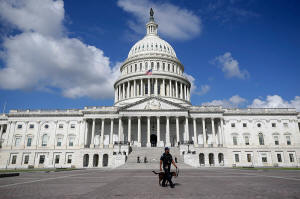Government shutdown looms as Congress returns after monthlong August
recess
[September 02, 2025]
By MARY CLARE JALONICK, KEVIN FREKING and STEPHEN GROVES
Congressional Republicans scored a massive victory this summer when they
passed President Donald Trump’s tax and spending cuts without a single
Democratic vote. But as they return to Washington this fall after a
monthlong August recess, they will have to find a way to work with
Democrats — or around them — as a government shutdown looms.
The annual spending battle will dominate the September agenda, along
with a possible effort by Senate Republicans to change their chamber's
rules to thwart Democratic stalling tactics on nominations. The Senate
is also debating whether to move forward on legislation that would slap
steep tariffs on some of Russia’s trading partners as the U.S. presses
Russian President Vladimir Putin on Ukraine.
In the House, Republicans will continue their investigations of former
President Joe Biden while Speaker Mike Johnson navigates a split in his
conference over whether the Trump administration should release more
files in the Jeffrey Epstein investigation.
A look at what Congress will be doing as lawmakers return from the
August break:
The priority is to keep the government open
The most urgent task for Congress is to avoid a government shutdown on
Sept. 30, when federal funding runs out. And it’s so far unclear if
Republicans and Democrats will be able to agree on how to do that.

Congress will have to pass a short-term spending measure to keep the
government funded for a few weeks or months while they try to finish the
full-year package. But Republicans will need Democratic votes to pass an
extension, and Democrats will want significant concessions. Senate
Democratic Leader Chuck Schumer’s vote with Republicans to avoid a
shutdown in March prompted furious backlash within his party.
The Trump administration's efforts to claw back previously approved
spending could also complicate the negotiations. Republicans passed
legislation this summer that rescinded about $9 billion in foreign aid
and public broadcasting funds and Trump notified Congress again on
Friday that he will block $4.9 billion in congressionally approved
foreign aid.
Democrats have warned that such efforts could tank the broader
negotiations. “Trump is rooting for a shutdown,” Sen. Chris Murphy,
D-Conn., posted on social media Friday.
Senate nominations fight looms
Senators are expected to return to Washington right where they left off
in early August — fighting over Trump’s nominees.
Exasperated Republicans fled Washington for the month after making
little headway with Senate Democrats over their nominations blockade,
which has forced delays in confirmations and angered Trump as many of
his administration’s positions remain unfilled. Republican leaders
called it quits after a rare Saturday session that ended with a
breakdown in bipartisan negotiations and Trump posting on social media
that Chuck Schumer could “GO TO HELL!”
Republicans now say they’re ready to try and change Senate rules to get
around the Democratic delays, and they are expected to spend the next
several weeks discussing how that might work.
Stiffer Russia sanctions are sought
Republican Sen. Lindsey Graham of South Carolina, one of Trump’s closest
congressional allies, has pushed the president for months to support his
sweeping bipartisan sanctions bill that would impose steep tariffs on
countries that are fueling Russia’s invasion of Ukraine by buying its
oil, gas, uranium, and other exports. The legislation has the backing of
85 senators, but Trump has yet to endorse it, and Republican leaders
have so far said they won’t move without him.

Graham has stepped up his calls after Trump met with Russian President
Vladimir Putin and Ukrainian President Volodymir Zelenskyy last month in
hopes of a peace deal. Since then, Russia has continued to step up
attacks on Ukraine.
“If we don’t have this thing moving in the right direction by the time
we get back, then I think that plan B needs to kick in,” Graham said of
his bill in an interview with The Associated Press last month.
[to top of second column]
|

A U.S. Capitol Police officer walks in front of the U.S. Capitol,
Aug. 22, 2025, in Washington. (AP Photo/Rahmat Gul)

Senate panel awaits RFK Jr. appearance
Health and Human Service Secretary Robert F. Kennedy Jr. will appear
before the Senate Finance Committee to discuss his health care
agenda on Thursday, less than a week after he ousted Susan Monarez
as director of the Centers for Disease Control and Prevention.
Several other top officials also resigned in protest.
Kennedy has tried to advance anti-vaccine policies that are
contradicted by decades of scientific research. Monarez’s lawyers
said she refused “to rubber-stamp unscientific, reckless directives
and fire dedicated health experts.”
Louisiana Sen. Bill Cassidy, the Republican chairman of the panel
that oversees the CDC and a member of the Finance Committee, has
called on the CDC to delay a meeting of outside experts who make
recommendations on the use of vaccines until Congress can look into
the issue.
A House divided over Epstein
The House left Washington in July in the midst of disagreements
among Republicans about whether they should force President Donald
Trump’s administration to release more information on the sex
trafficking investigation into the late Jeffrey Epstein. The
pressure for more disclosure could only get more intense when
lawmakers return.
Democratic Rep. Ro Khanna of California and Republican Rep. Thomas
Massie of Kentucky are pushing the House to take up their bill to
force the Justice Department to release its investigation. They are
planning a news conference joined by Epstein victims. The House
Oversight Committee is also investigating the issue.
Democrats are eager to keep pressing on the Epstein files,
especially after the Trump administration reneged on pledges for
transparency. The case for years has been the subject of online
conspiracy theories and speculation about who may have been involved
or aware of the wealthy financier’s abuse.

GOP focuses on Biden's mental fitness in office
The House Oversight Committee will return from August recess with a
slate of interviews lined up as part of its investigation into
former President Joe Biden’s mental state while in office. The
committee has already conducted interviews and depositions with
nearly a dozen former top Biden aides and members of the president’s
inner circle.
The Republican-led committee will hear from former top Biden
staffers in September like Jeff Zients, Biden’s final White House
chief of staff, Karine Jean-Pierre, the former White House press
secretary, and Andrew Bates, a top press aide.
Oversight Chair James Comer, R-Ky., has said public hearings and a
full report can be expected sometime in the fall.
A stock trading ban is weighed
Congress has discussed proposals for years to keep lawmakers from
engaging in trading individual stocks, nodding to the idea that
there’s a potential conflict of interest when they are often privy
to information and decisions that can dramatically move markets.
That push is now gaining momentum. A Senate committee has approved
legislation from GOP Sen. Josh Hawley of Missouri that would also
extend the prohibition on stock trading to future presidents and
vice presidents — while notably exempting Trump. In the House,
several members are putting forward proposals and even threatening
to maneuver around the GOP leadership to force a vote.
Still, there is plenty of resistance to the idea, including from
many wealthy lawmakers who reap dividends from their portfolios.
___
Associated Press writers Matt Brown and Joey Cappelletti contributed
to this report.
All contents © copyright 2025 Associated Press. All rights reserved |